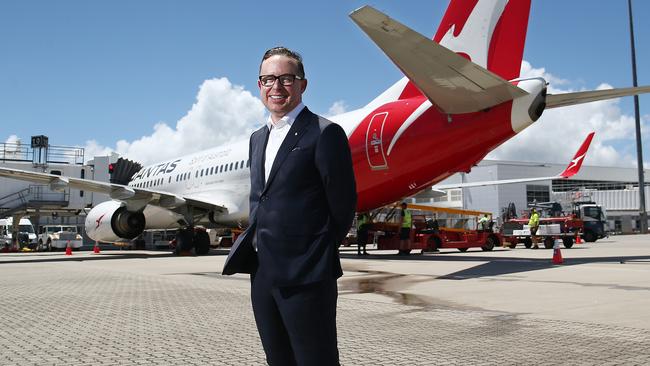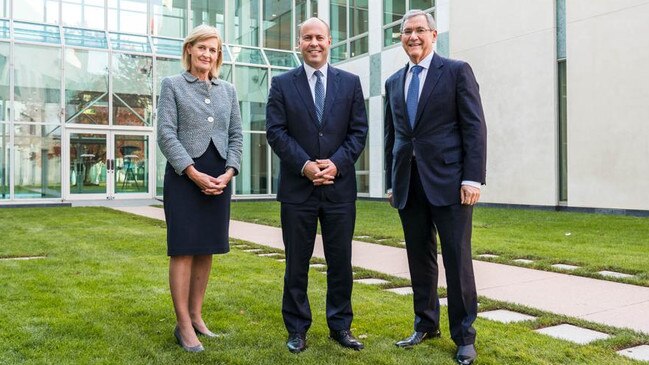
It is also no accident the airline has hooked up as a key link in the Australian carbon club to get there.
The problem now falls under Andrew Parker, who goes under the title group executive, government, industry, international and sustainability.
His predecessor was Megan Flynn, who started in 2013 after a few years at lawyers Baker McKenzie, where her lead partner was Martijn Wilder — and now she is a partner at the advisory firm he started called Pollination.
She also sits on the board of Tasman Environmental Markets (TEM), where former Carbon Markets Institute chief Peter Castellas is now the CEO and one of the firm’s key clients is Qantas.
Flynn also sits on the board of the Carbon Market Institute, now run by John Connor.
Its aim is to represent businesses leading the transition to a net-zero-emission economy, share knowledge, build capacity and catalyse on opportunities.
Qantas and TEM run a program called Future Planet, which “provides a carbon offsetting solution for corporate businesses wanting to offset their operational or unavoidable emissions to reduce their environmental impact”.
TEM’s goal is to connect businesses with emission reduction goals and environmental-oriented consumer markets with high-impact carbon offset markets.
Qantas has opened the door to partners and like-thinking companies ranging from Australia Post to DHL, to lawyers Allens Linklaters, tea producer T2 and KFC, to bring them into the offset program.
It’s a small world.
–
Flying high in offsets
Telstra’s Ben Burge rightly questions companies that charge customers to pay for offset programs, which is what roughly 10 per cent of Qantas’s customers do now.
Parker acknowledges the argument, but suggests when you are running a product in which 80 per cent of emissions come from jet fuel, it’s hard to produce the winning product that cuts emissions and gets people from Melbourne to Sydney in 90 minutes.
Qantas is a big player in the offset market, investing in Australia and offshore, including in a sugar cane reforestation program in Cairns that uses the sugarcane fertiliser to grow the forest and save the leakage to the coral reefs, which feeds the crown of thorns starfish that prey on the reefs.
The airline has another project in PNG, exchanging solar panels in villages in return for not burning the forests to create energy.
Such projects, Parker argues, are the right thing to do and are supported by customers. They are rewarded with frequent-flyer points and Qantas matches the customer investment.
The airline has made some easy changes, like buying newer, lighter planes, using better navigation systems to reduce flying time and distances and in the process cutting emissions.
It is also working with BP on alternate fuels in a strategic partnership to “further advance their shared net-zero ambitions”.
Los Angeles airport in the US sells a jet fuel that is 10 per cent-derived from mustard seeds, which have the added advantage of being able to be grown in down periods between other crops.
The hunt is on to find similar fuel that can be grown in land not considered arable for conventional crops and also innovations such as municipal waste.
Qantas has offset three million tonnes of carbon since 2014 on projects that provide an admittedly medium-term solution, but there is no questioning the motive behind the hunt, which is long-term sustainability.
–
Clearing air on carbon
Clean Energy regulator David Parker had an issue with a column last week on his proposed changes to make the carbon trading market simpler.
A noble cause, which in itself is a tacit admission that while the government runs a million miles from the concept, it runs a carbon market that sets a carbon price.
In the note the CER, referring to the use of the word mechanism, said: “A ‘mechanism’ refers to policies like a carbon tax, an emissions trading scheme, or declining Safeguard Mechanism baselines – all of which the Australian government has categorically ruled out.
“Participation in the Australian carbon exchange is voluntary, and the purpose is to make the trading of Australian carbon credit units (ACCUs) simpler.
“It is not the Australian government’s intention to formalise the voluntary demand. However, it will support the rapidly increasing voluntary demand from the corporate sector. It will increase market transparency including pricing, slashing transaction costs and reducing red tape, while accelerating emissions reduction and providing a boost to Australia’s economic recovery.”
Understood!
–
Busy day for Longo
New ASIC boss Joe Longo will face another parliamentary review this week when he fronts the Parliamentary Joint Committee on Corporations and Financial Services.
The afternoon hearing on Friday will follow a morning session with the Financial Complaints Authority Obmudsman, David Locke.

Longo, who started at the corporate cop this month, will appear with the rest of the commission, including new enforcement commissioner Sarah Court, amid concerns over share equity raisings that disadvantage small shareholders.
Locke’s attendance will be the first for him and AFCA and the committee will be keen to understand how it will operate and the extent of any post-Covid-19 concerns.
Longo has commissioned a four-week report by PwC on ASIC’s backroom operations, including HR and IT, but no policy issues.
The report is billed as housekeeping.
Josh Frydenberg is pressing ahead with plans to report an oversight body to ASIC and APRA, which was recommended by the financial services royal commission.
A string of key personnel changes were made at ASIC before Longo joined, including Zac Gordon as head of risk, Scott Barber as data director and Warren Day as acting chief operating officer. These posts were recommended by the capability review five years ago.
Day was appointed to the job for six months about three months ago, which means a formal appointment will follow after a potential full search.
The ASIC and APRA review legislation is at best a second half of the year event – which assumes, as some speculate, there is no election in November.
The Treasurer has worked on a panel to be the review body but it is understood former ACCC boss Graeme Samuel will not head the body.
A panel including Treasury head Steven Kennedy will be unveiled when Frydenberg has his new statement of expectations ready to be announced.
Frydenberg is keen to paint ASIC as a new reformed regulator under Longo with James Shipton stepping down last month.
He left after an auditor general report on issues around his appointment and subsequent review by Vivienne Thom.
A short version of her report was released earlier this year.
When the review panel is unveiled, the regulator will be subject to another capability review.
The personnel decisions have been made so the key task is cultural overhaul, which will come with the capability review.
Amid all this scene setting, ASIC has managed to operate and most would think the best step would be to let it get on with its job.








Aviation ranks as one of the hardest sectors to transition to a net-zero-emissions world, which makes it all the more commendable that Qantas boss Alan Joyce was one of the first to commit to being carbon net neutral by 2050.